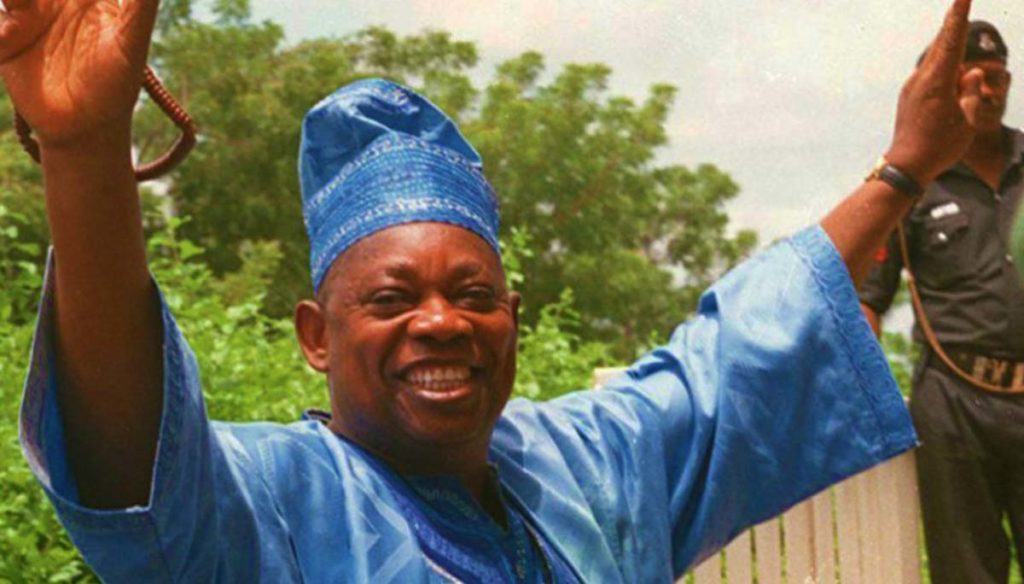As we forge on with our democracy, we must pause and reflect on the lessons we must learn from our June 12 experience. June 12 gave us a significant leap towards legitimate democracy. However, it would be unconscionable not to admit that we have also taken some steps backwards where same was avoidable.

By Dakuku Peterside
Democracy is taken for granted as the best form of government. At least the West told us so. We have also accepted it by default. We have tried multiple facets of democratic systems – parliamentary and presidential systems, two-party and multi-party systems – and some are arguing we have a bespoke democracy that is uniquely Nigerian. Homegrown in every shape!! It gives us a sense of participation. It allows for fair representation, and many argue that the representation is not yet wholly free. But whatever and whichever form of democracy a nation elects to practice, the ultimate objective is freedom, law and order, and to deliver public goods, in my view. Nigerians expect and deserve nothing less.
Since Nigeria’s Independence in 1960, she has gone through three dominant democratic interregnums and a few quasi-democratic experiences. Nigeria has witnessed a blend of militarism and democratic tenets of voting and some representation. This 4th Republic democratic dispensation is significant because it has lasted for 24 uninterrupted years. That said, we can comfortably argue that our democracy is no longer a baby but attained teenage at least. Thus, our democratic journey calls for introspection and a critical review of the structures and processes in order to identify inherent weaknesses and strengths to correct and reinforce respectively.
Truth is, the nation laid the foundation of our current democracy on June 12, 1993. On that day and season, we established the elements of legitimate democracy. The election, widely regarded as one of Nigeria’s freest and fairest, became the symbol of democracy in Nigeria and offered hope that Nigeria could hold a free, fair and rancour-free election.
The critical elements of that election made it unique in all ramifications: Free and fair electoral process and a two-party system. The choice was binary (for either SDP or NRC), which promoted real competition. Though achieved by an unelected military regime with an outspoken professor of Political Science, Humphrey Nwosu, as midwife heading the arguably independent electoral Commission, the security apparatus of State was manifestly impartial; citizen participation was intense, and their trust in the system was high enough. Besides, citizens guarded the process and owned it. Voting was unhindered while collation and tabulation of results were open and transparent. Money played a minimal role in electoral choices. The outcome of that election blurred north-south division and Muslim-Christian dichotomy.
Sadly, these elements, commendable as they were, could not stop the doom that the election faced in the long run. This is the reason the dashing of that national hope and the momentum gained in our march to democracy with the annulment of the June 12, 1993 presidential election in Nigeria remains a significant event in the country’s political history. It would remain so for years to come. The military government annulled the national unity election, thereby depriving the winner, Chief Moshood Abiola, the fulfillment of assuming office as President and Commander-in-Chief.
Beyond Abiola, the annulment of June 12 had far-reaching consequences for Nigeria’s democracy. Amongst others, it fractured the national fabric but we mended fences in 1999; it led to years of political instability and disillusionment. Nigeria has struggled to hit that altitude of electoral performance ever since! Therefore, restoring the spirit of Nigeria’s democracy after the June 12 annulment requires a multifaceted approach that addresses both immediate and long-term challenges. Even though Nigeria is still learning to improve her electoral democracy, it is clear that we learnt from that annulment experience. We appear to have made significant progress since June 12. So significant, the immediate past Administration of President Muhammadu Buhari in yielding to national conscience renamed June 12 as our nation’s Democracy Day instead of the May 29 day for transition of power from one democratically elected Government to another. However and sadly so, whenever we move two steps forward, some forces pull us another step backwards. This pattern is becoming established.
Our democracy has made significant progress in some areas, and I will focus on four major areas.
First, we have been holding periodic elections, no matter how imperfect they are, since 1999. This has led to electoral representation at all levels. Representative democracy has been established though no entrenchment of a democratic culture. Also, Nigeria witnessed for the first time in its history that an opposition party won a general election in 2015. Thirdly, we have established freedom of expression owing to a robust and resilient media. Evidence is found at least in the mainstream media, civil society and social media spaces. But we have also experienced at various times governments at the Federal and State levels impinge on the rights of Twitter users and some broadcast stations to express their voices freely and responsibly on various contentious issues in the country through deployment of coercive institutions. Happily however, this censorship has not been a constant feature of the government.
READ ALSO: June 12: Orji Kalu advocates democratic virtues
The fourth is that we have put all necessary institutions of the State in place. These democratic institutions are the instrumentality for delivering State functions. Nevertheless, these institutions are weak and fail most of the time to deliver on their mandate. They are often captured by State actors and used to perpetuate actors’ hegemony on fragile people. Nigeria’s democratic conundrum is an aberration in the sense that it has strong actors and weak institutions. This has allowed for State capture by these influential actors. We need to strengthen these four crucial areas to reap the full benefit of democracy.
First, the Nigerian brand of democracy must be transformed. A democracy that has failed to translate to governance success must be recalibrated. The indicators are there. From widening poverty, ignorance to insecurity. Most citizens do not have access to basic things of life. This constitutes a threat to democracy. Second, Nigerian democracy has failed to provide most citizens with basic physical, social, economic and psychological security. This has untold implications because protecting the citizens and Nigeria’s territorial integrity is the State’s primary function. Insecurity has caused the loss of many lives and property, destroyed economic activities and potential in many parts of the country, especially in the ungoverned areas.
Third, the State has failed to engender respect for law, order and equality of persons before the law. Thus, there remains in our country’s democracy a derogation of the rule of law as a fundamental principle of democracy. The rule of law simply means that the law rules supreme; no one is above the law no matter their status in society and the law is no respecter of persons. In some instances, the law has been trampled upon by influential individuals and entrenched interests within society with impunity. Fourth, the weak institutions of the State set up to enforce democracy: the Judiciary, INEC, Law enforcement agencies as public accountability framework have wreaked havoc on the system. We must strengthen these institutions to fulfil their mandate to the people and the State or our democracy would remain imperiled.
As we forge on with our democracy, we must pause and reflect on the lessons we must learn from our June 12 experience. June 12 gave us a significant leap towards legitimate democracy. However, it would be unconscionable not to admit that we have also taken some steps backwards where same was avoidable.
The celebration of democracy day today should afford us the opportunity for sober reflection on the state of our democratic journey and the urgent need to identify reforms that could strengthen democracy. The important lessons we must learn from June 12 are outlined below.
The first lesson is the Importance of Free and Fair Elections. The June 12 election underscored the significance of conducting free and fair elections. It demonstrated that when the will of the people is disregarded, it can lead to social and political unrest. The lesson here is that governments must ensure transparent electoral processes that reflect the genuine choice and will of the people. The second lesson is the importance of accountability and transparency in governance. The lack of transparency surrounding the annulment process created suspicion and eroded public trust. Leaders must be accountable to the people and ensure transparency in their actions and decision-making processes. Trust builds confidence, legitimacy, and unity. The third is the power of civic engagement and activism. The June 12 election and its aftermath witnessed significant civic engagement and activism by the Nigerian people. It highlighted the power of citizens to advocate for their rights and demand accountability from their leaders. The lesson is that active civic participation is essential for developing and preserving a stable democracy. The next lesson is managing ethnic diversity and political pluralism. Leaders must work towards fostering national unity, promoting dialogue and finding common ground to prevent the escalation of our undeniable fault lines.
Furthermore, we must learn to build strong democratic institutions. The June 12 event revealed the weaknesses in Nigeria’s democratic institutions, particularly the electoral and judicial systems. It underscored the need for building and strengthening institutions that can withstand political pressures and ensure the integrity of democratic processes. Even 30 years after the June 12 debacle, Nigeria still struggles with weak institutions. This new administration must work to correct this anomaly.
Finally, the June 12 annulment showed the importance of upholding democratic values such as freedom of expression, association and the right to vote. These values are fundamental to a functioning democracy and should be protected and promoted. Leaders and institutions must be committed to safeguarding democratic principles.
June 12 serves as a reminder that nations should learn from their history to avoid repeating past mistakes. It is crucial to reflect on the lessons from such events and take proactive measures to safeguard democracy and prevent similar situations. It is crucial to reflect on the lessons from such events and take proactive measures to safeguard democracy and prevent similar situations.
Restoring the spirit of Nigeria’s democracy after the June 12 annulment is a long-term endeavour that requires sustained efforts from both the government and the Nigerian people. It demands a commitment to democratic values, active citizen participation and a collective determination to build a more inclusive Nigeria. Now is the time to promote good governance, fight corruption, foster national reconciliation, enhance freedom of speech and conscience, strengthen democratic institutions, encourage citizen participation and engagement as well as ensure further electoral reforms to consolidate on the progress made thus far as we work to deepen our democracy. The signs we see from this new government suggest that we have a government that may push Nigeria forward. The actions of the government in the right direction in the few months to come will surely lay the foundations of a more robust, better democracy. This is wishing our dear country a Happy Democracy Day.













